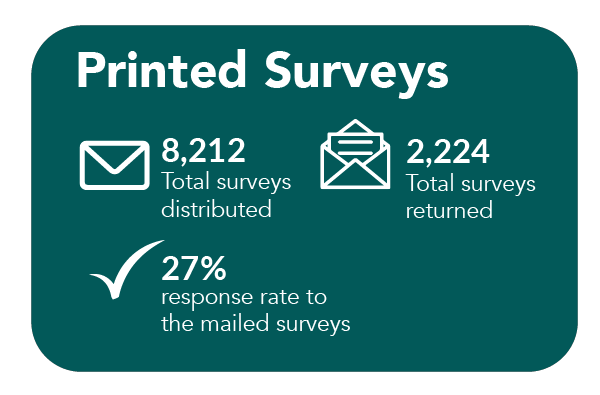Methods
A wide range of Iowans—landowners and farmers, urban and rural residents not involved in farming, and young adults attending Iowa’s three regent universities, many of whom had been exposed to increased water quality outreach throughout their primary and secondary school years—participated in opportunistic surveys, interviews, and a series of listening sessions in 2022-23 to share their perspectives about water quality in the state.
To ensure a dataset comprising input from that diverse group of respondents, the team employed multiple data collection methods, including—
The project team primarily used two types of sampling for this study:
Opportunistic sampling takes advantage of the availability of groups who are already gathered in one place, such as the college students at Iowa’s three regent universities, or the participants in an ISU Field Day. It is particularly useful for informal or exploratory research.
Random sampling ensures that any member of the group has an equal chance of being selected for the survey. For example, the CLG team interviewed university students as they walked through high-traffic areas on campus, with no preselection or predetermined pattern. Random sampling can help to eliminate bias or skewing of study results.
Gathering responses in this manner does not necessarily garner a representative statistical sample of the state’s population. This project was not intended to be a formal and rigorous research study, but rather to provide a snapshot of what had changed and remained constant after a decade had passed.
Survey
Survey Distribution
Printed Survey
A printed version of the Water Issues in Iowa survey was mailed to Iowa landowners in January 2022, using addresses derived from a random sample of digitized plat maps and Iowa Learning Farms field day attendee mailing lists. A second mailing was sent to all Iowa Soil and Water Conservation District commissioners in February 2022.
Online Survey
The Water Issues in Iowa survey was sent electronically via Qualtrics to all undergraduate college students at the three Iowa regent universities, in partnership with ISU Information Technology Services, Iowa Flood Center at UI and Tallgrass Prairie Center at UNI, between January - March 2022. Students who completed the survey by the announced deadline were entered into a drawing for a gift card.
The survey was also distributed electronically in February 2022 via the Water Rocks! e-newsletter, by the Iowa Environmental Council, and sharing via the Iowa Learning Farms blog and e-newsletter.
Survey Responses
The survey yielded 5,538 total respondents, showing a 27 percent response rate among the general public and a 5.5 percent response rate among college students. Though their response percentage was considerably lower than the general population’s, at 2,821 returns the college students constituted more than half of the sample responses. College student responses were analyzed separately to avoid skewing the results, and to enable the team to explore potential differences between the perceptions of younger Iowans and those of the (typically older) general public.
Campus Interviews
CLG team members traveled to Iowa’s three regent universities over three days in April 2022. Video interviews were conducted in well-trafficked areas of each campus and were designed to record the voices of Iowa’s young adults expressing their understanding of water quality issues in the state. Potential respondents were selected at random and asked if they would participate in the interview. Students who chose to participate signed a waiver to use their responses. Interviewers began with a list of prompt questions, similar to those asked a decade prior, and numerous unscripted follow-up questions ensued. A total of 60 interviews were conducted across the three campuses.
Prompt questions for campus interviews:
What is a watershed?
Is there a water quality problem in Iowa? If yes, what is the water quality challenge or problem? Where is the problem? What causes the problem?
Do you like to recreate on lakes/rivers in Iowa? Would you swim in them?
Is climate change happening? Is it something you worry about?
What can we do in regard to environmental issues? Whose responsibility is it?
Listening Sessions
To better understand the survey work and campus interviews, the CLG team conducted six stakeholder listening sessions, three rural and three urban, in February and March 2023. Listening sessions began with prompt questions, and the moderator allowed conversation to go where participants wanted to take it. The listening sessions included a total of 47 participants, with 23 farmers and 24 urban residents.
Prompt questions for listening sessions:
Ice breaker question: Could you share with me a recent experience with water: a lake, river, stream, or any experience with water, flooding, etc. (Go around room and let everyone answer.)
What is a water quality problem and what would it look like? (The goal was to get them to define it and their responses were listed on easel pads.)
Under these parameters, do you have any of these problems in your areas?
Do you know what an impaired water body is? Are there any in your area?
Who is most responsible to address these types of water quality problems?
If they say individual—ask: Why is it your personal responsibility? What does that mean? What actions should you take?
What is the role of government (from SWCD to state/federal) in addressing water quality concerns?
How well are the groups fulfilling their responsibilities? Are more resources needed? What types of resources?


